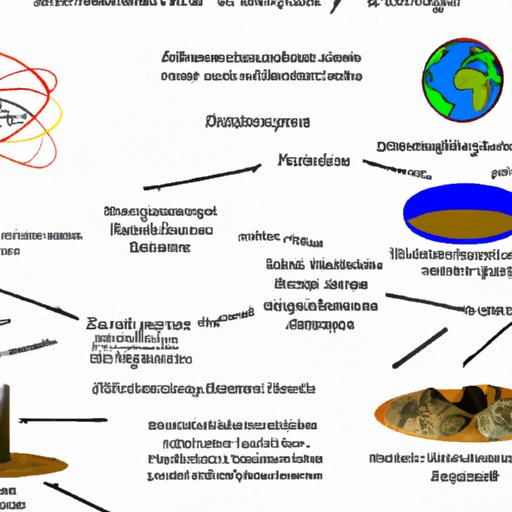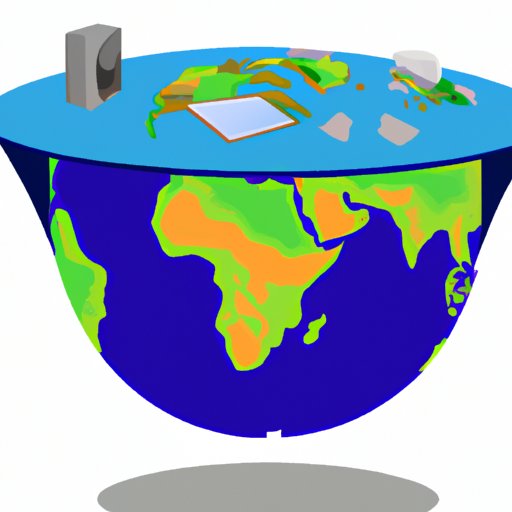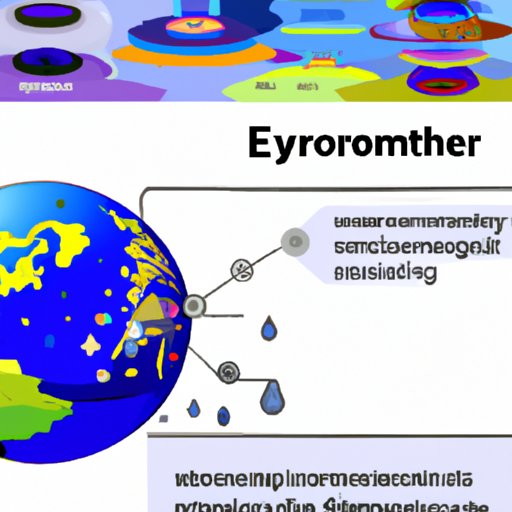Introduction
Earth system science (ESS) is an interdisciplinary field of study that seeks to understand the complex interactions between the atmosphere, biosphere, geosphere, and hydrosphere of our planet. By studying these interconnected systems, scientists are able to gain a better understanding of the Earth’s climate, environment, and ecology. This article will provide an overview of ESS, exploring its purpose and examining the role of climate change, human activity, and natural disasters in shaping Earth’s systems.
Overview of Earth System Science
Earth system science is a relatively new field of study that emerged in the late 20th century. According to the National Center for Atmospheric Research (NCAR), “ESS is an interdisciplinary field that draws on the natural sciences, mathematics, engineering, and social sciences to study the Earth as an integrated system.” The goal of ESS is to better understand the complex interactions between the earth’s systems, including the atmosphere, biosphere, geosphere, and hydrosphere. By studying these interconnected systems, scientists are able to gain a better understanding of the Earth’s climate, environment, and ecology.
Earth system science is based on the idea that each of the Earth’s systems is connected and can influence one another. For example, changes in the atmosphere can affect the biosphere, and changes in the biosphere can affect the geosphere. As NCAR explains, “The Earth system is a complex, dynamic system consisting of many components that interact with each other.” By studying these interactions, scientists are able to gain a better understanding of how our planet works.
Exploring the Interconnections Between Earth’s Systems
One of the key goals of Earth system science is to explore the interconnections between the atmosphere, biosphere, geosphere, and hydrosphere. Each of these systems plays an important role in maintaining the health of the planet and its inhabitants. For example, the atmosphere helps regulate the temperature of the Earth and its ecosystems, while the biosphere is home to all living creatures. The geosphere contains the solid rocks and minerals that form the Earth’s crust, and the hydrosphere consists of all the water on the planet.
By studying the interactions between these four systems, scientists are able to gain insight into how they interact and influence one another. For example, scientists have found that changes in the atmosphere can have a profound effect on the biosphere, leading to changes in the climate and weather patterns. Similarly, changes in the biosphere can have an impact on the geosphere, such as increases in erosion or changes in soil composition.
In addition to exploring the interactions between the atmosphere, biosphere, geosphere, and hydrosphere, Earth system science also examines the role of climate change in shaping these systems. Climate change is a major factor in the global environment, and scientists are studying how it is impacting the Earth’s systems. For example, climate change has been linked to increases in extreme weather events, such as floods, droughts, and hurricanes, which can have a significant impact on the atmosphere, biosphere, geosphere, and hydrosphere.

Examining the Role of Human Activity in Earth System Science
Another key focus of Earth system science is the role of human activity in shaping the Earth’s systems. Humans have had a tremendous impact on the planet, from altering the atmosphere to changing the landscape of the biosphere. Scientists are studying how human activity is impacting the Earth’s systems, including the atmosphere, biosphere, geosphere, and hydrosphere.
For example, humans have been burning fossil fuels for centuries, releasing large amounts of carbon dioxide and other greenhouse gases into the atmosphere. These gases trap heat, leading to an increase in the average global temperature. This phenomenon, known as global warming, has had a significant impact on the Earth’s climate and environment, leading to changes in weather patterns and sea levels.
In addition to studying the impact of human activity on Earth’s systems, scientists are also examining the role of technology in monitoring and studying them. Technology has enabled scientists to observe and measure the Earth’s systems in unprecedented detail, allowing them to gain a better understanding of how they work and how they are being impacted by human activity and climate change.

A Look at Current Research in Earth System Science
Earth system science is an active field of research, with scientists around the world studying the Earth’s systems and their interactions. One of the main focuses of current research is the effects of natural disasters on the Earth’s systems. For example, scientists are studying how earthquakes, floods, and droughts can affect the atmosphere, biosphere, geosphere, and hydrosphere.
In addition to natural disasters, scientists are also studying the effects of human-induced changes to the Earth’s systems. For example, researchers are studying how deforestation, overfishing, and pollution are impacting the atmosphere, biosphere, geosphere, and hydrosphere. By studying these effects, scientists are able to gain a better understanding of how the Earth’s systems are being impacted by human activity.

The Future of Earth System Science
As the Earth’s systems continue to be impacted by human activity and climate change, there is an increasing need for research in Earth system science. The future of ESS will involve continued exploration of the interconnections between the atmosphere, biosphere, geosphere, and hydrosphere. It will also involve studying the effects of human activity and natural disasters on the Earth’s systems.
In addition, the future of ESS may involve the use of technology to monitor and study the Earth’s systems. For example, scientists are already using satellites to observe the Earth’s atmosphere and oceans, and this technology could be used to study the interactions between the atmosphere, biosphere, geosphere, and hydrosphere. By utilizing advanced technologies, scientists may be able to gain a more comprehensive understanding of the Earth’s systems.
The potential benefits of Earth system science are vast. By gaining a better understanding of the Earth’s systems, scientists are able to develop strategies for mitigating the impacts of climate change and human activity. In addition, ESS can help us better understand and prepare for natural disasters, such as floods, droughts, and earthquakes.
Conclusion
Earth system science is an interdisciplinary field of study that seeks to understand the complex interactions between the atmosphere, biosphere, geosphere, and hydrosphere. By studying these interconnected systems, scientists are able to gain a better understanding of the Earth’s climate, environment, and ecology. In addition, ESS is examining the role of climate change, human activity, and natural disasters in shaping Earth’s systems. Finally, the future of ESS will involve the use of technology to monitor and study the Earth’s systems, as well as continued research into the effects of human activity and natural disasters on the Earth’s systems.
In conclusion, Earth system science is a rapidly growing field of study that is providing us with a better understanding of the Earth’s systems and their interactions. By studying these systems, scientists are able to gain insight into how the Earth works, as well as the potential impacts of human activity and climate change. Through continued research and the use of technology, ESS can help us better understand and prepare for the future of our planet.
(Note: Is this article not meeting your expectations? Do you have knowledge or insights to share? Unlock new opportunities and expand your reach by joining our authors team. Click Registration to join us and share your expertise with our readers.)
